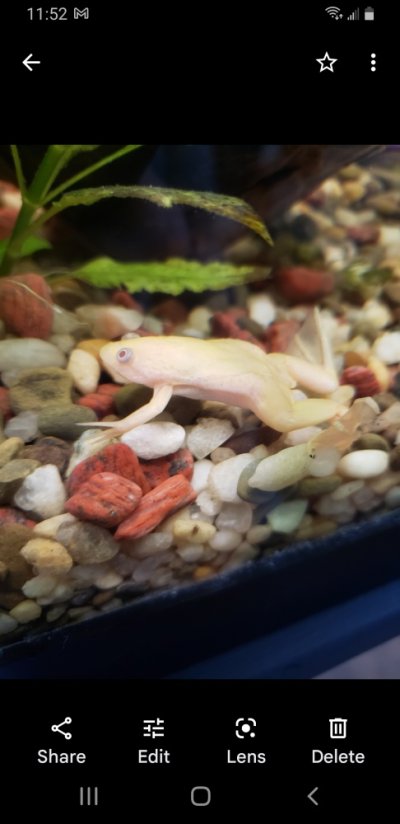do i have an African clawed frog here. image attached. if so does it need to be separated from the fish in my tank. it's about two inches big now and hasn't eaten any of my adult fish yet. i have some danios and mollies in the tank and from what I'm reading the frog will get larger and will eat any fish it can. it was very small when i bought it and i blame myself for not being more inquisitive when i bought it . i just want to do the best for all my animals and the pet store will take it back .thanks Paul. i am new.
You are using an out of date browser. It may not display this or other websites correctly.
You should upgrade or use an alternative browser.
You should upgrade or use an alternative browser.
african clawed frog identify
- Thread starter pberm1962
- Start date
The friendliest place on the web for anyone with an interest in aquariums or fish keeping!
If you have answers, please help by responding to the unanswered posts.
If you have answers, please help by responding to the unanswered posts.
Colin_T
Aquarium Advice Addict
Hi Paul and welcome to the forum 
It looks like an albino African clawed frog. They have individual fingers on the front hands. The African dwarf frog has webbed hands.
Frogs should be kept in a single species tank without fish for a couple of reasons. If the fish get sick, any medication used to treat the fish will usually kill the frog. When the frog gets bigger, it could eat fish, shrimp and snails.
-----------------
What are the tank dimensions (length x width x height)?
What is the GH (general hardness), KH (carbonate hardness) and pH of your water supply?
This information can usually be obtained from your water supply company's website or by telephoning them. If they can't help you, take a glass full of tap water to the local pet shop and get them to test it for you. Write the results down (in numbers) when they do the tests. And ask them what the results are in (eg: ppm, dGH, or something else).
Depending on what the GH of your water is, will determine what fish you should keep.
Angelfish, discus, most tetras, most barbs, Bettas, danios, gouramis, rasbora, Corydoras and small species of suckermouth catfish all occur in soft water (GH below 150ppm) and a pH below 7.0.
Livebearers (guppies, platies, swordtails, mollies), rainbowfish and goldfish occur in medium hard water with a GH around 200-250ppm and a pH above 7.0.
If you have very hard water (GH above 300ppm) then look at African Rift Lake cichlids, or use distilled or reverse osmosis water to reduce the GH and keep fishes from softer water.
Frogs come from soft water with a GH below 100ppm.
It looks like an albino African clawed frog. They have individual fingers on the front hands. The African dwarf frog has webbed hands.
Frogs should be kept in a single species tank without fish for a couple of reasons. If the fish get sick, any medication used to treat the fish will usually kill the frog. When the frog gets bigger, it could eat fish, shrimp and snails.
-----------------
What are the tank dimensions (length x width x height)?
What is the GH (general hardness), KH (carbonate hardness) and pH of your water supply?
This information can usually be obtained from your water supply company's website or by telephoning them. If they can't help you, take a glass full of tap water to the local pet shop and get them to test it for you. Write the results down (in numbers) when they do the tests. And ask them what the results are in (eg: ppm, dGH, or something else).
Depending on what the GH of your water is, will determine what fish you should keep.
Angelfish, discus, most tetras, most barbs, Bettas, danios, gouramis, rasbora, Corydoras and small species of suckermouth catfish all occur in soft water (GH below 150ppm) and a pH below 7.0.
Livebearers (guppies, platies, swordtails, mollies), rainbowfish and goldfish occur in medium hard water with a GH around 200-250ppm and a pH above 7.0.
If you have very hard water (GH above 300ppm) then look at African Rift Lake cichlids, or use distilled or reverse osmosis water to reduce the GH and keep fishes from softer water.
Frogs come from soft water with a GH below 100ppm.
Similar threads
- Replies
- 1
- Views
- 398
- Replies
- 2
- Views
- 375
- Replies
- 2
- Views
- 574
- Replies
- 1
- Views
- 604

